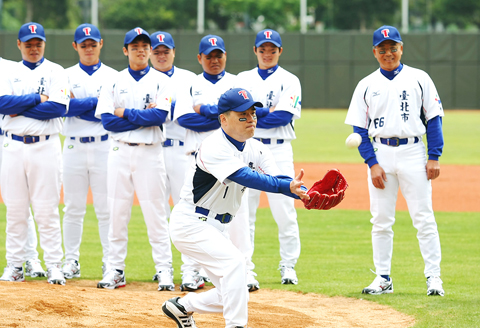Taipei Mayor Hau Lung-bin (郝龍斌) introduced members of the city’s new baseball team yesterday, shrugging off questions from reporters on the selection process.
The Taipei City Government formed its own baseball team last week as part of government efforts to revive the sport following the national team’s embarrassing defeat to China at the World Baseball Classic last month.
Hau yesterday presented the baseball team’s flag to head coach Kao Ying-chieh (高英傑), former coach of New York Yankees’ pitcher Wang Chien-ming (王建民), and joined the 21 players selected for practice at Tianmu Baseball Park.

PHOTO: CNA
The city government had planned to select 25 players for the team, but only recruited 21 players — retired professionals, college and high school players.
Former dmedia T-Rex player Hsu Chu-jien (許竹見), who failed to be selected by the committee, challenged the selection process on Monday, claiming Taipei City Government had included him on a “blacklist” based on rumors that he was involved in gambling and match-fixing.
The dmedia T-Rex team was disbanded after chairman Shih Jian-hsin (施建新) and some of the players were alleged to have been involved in gambling and match fixing.

PHOTO: CNA
Chinese Nationalist Party (KMT) Taipei City Councilor Chen Yu-mei (陳玉梅) also called on the city government to explain its selection process.
Hau yesterday dismissed the allegations about a blacklist and said the government simply required team players to display integrity, in addition to professional skills.
Hau said the city government would arrange for team members to serve as school coaches or contractors at municipal departments, so integrity and good behavior were important elements when selecting players.
The local governments in Taipei County, Taoyuan County and Taichung City have also formed their own municipal baseball teams as part of government efforts to nurture baseball talent.

CHANGING LANDSCAPE: Many of the part-time programs for educators were no longer needed, as many teachers obtain a graduate degree before joining the workforce, experts said Taiwanese universities this year canceled 86 programs, Ministry of Education data showed, with educators attributing the closures to the nation’s low birthrate as well as shifting trends. Fifty-three of the shuttered programs were part-time postgraduate degree programs, about 62 percent of the total, the most in the past five years, the data showed. National Taiwan Normal University (NTNU) discontinued the most part-time master’s programs, at 16: chemistry, life science, earth science, physics, fine arts, music, special education, health promotion and health education, educational psychology and counseling, education, design, Chinese as a second language, library and information sciences, mechatronics engineering, history, physical education

The High Prosecutors’ Office yesterday withdrew an appeal against the acquittal of a former bank manager 22 years after his death, marking Taiwan’s first instance of prosecutors rendering posthumous justice to a wrongfully convicted defendant. Chu Ching-en (諸慶恩) — formerly a manager at the Taipei branch of BNP Paribas — was in 1999 accused by Weng Mao-chung (翁茂鍾), then-president of Chia Her Industrial Co, of forging a request for a fixed deposit of US$10 million by I-Hwa Industrial Co, a subsidiary of Chia Her, which was used as collateral. Chu was ruled not guilty in the first trial, but was found guilty

Taiwan-based publisher Li Yanhe (李延賀) has been sentenced to three years in prison, fined 50,000 yuan (US$6,890) in personal assets and deprived political rights for one year for “inciting secession” in China, China's Taiwan Affairs Office spokesman Chen Binhua (陳斌華) said today. The Shanghai First Intermediate People’s Court announced the verdict on Feb. 17, Chen said. The trial was conducted lawfully, and in an open and fair manner, he said, adding that the verdict has since come into legal effect. The defendant reportedly admitted guilt and would appeal within the statutory appeal period, he said, adding that the defendant and his family have

DEADLOCK: As the commission is unable to forum a quorum to review license renewal applications, the channel operators are not at fault and can air past their license date The National Communications Commission (NCC) yesterday said that the Public Television Service (PTS) and 36 other television and radio broadcasters could continue airing, despite the commission’s inability to meet a quorum to review their license renewal applications. The licenses of PTS and the other channels are set to expire between this month and June. The National Communications Commission Organization Act (國家通訊傳播委員會組織法) stipulates that the commission must meet the mandated quorum of four to hold a valid meeting. The seven-member commission currently has only three commissioners. “We have informed the channel operators of the progress we have made in reviewing their license renewal applications, and